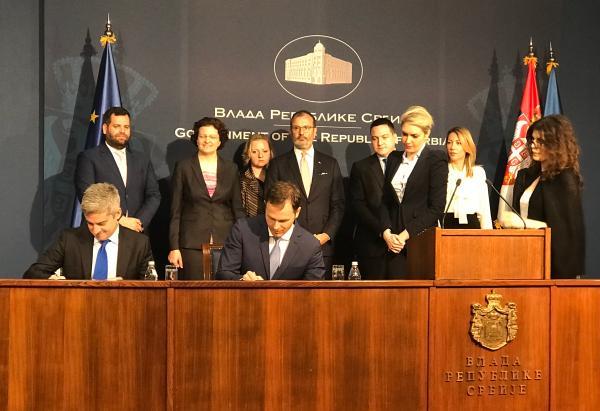
- The EU Bank provides EUR 22 million to finance local infrastructure in Serbian municipalities
- The project helps municipalities to cope with natural disasters and the consequences of migration
- First EIB project in Serbia to be implemented by the Ministry of Public Administration and Local Self-Government in cooperation with the UNDP
The European Investment Bank (EIB) is helping to strengthen economically disadvantaged areas of Serbia against future shocks with the Partnership for Local Development. The project signed today in Belgrade provides EUR 30 million to revitalise public infrastructure in poor municipalities in Serbia that have been affected by migration and natural disasters like flooding.
The Partnership will be financed by a EUR 22 million loan from the EIB and co-financed by the United Nations Development Programme (UNDP) and through contributions from municipalities themselves. This is the first project implemented by the Ministry of Public Administration and Local Self-Government in cooperation with the UNDP in Serbia. The investment is funded under the EIB’s Economic Resilience Initiative (ERI).
It will support the convergence towards EU standards in the quality of the core economic infrastructure. Investment is planned to go into a variety of public infrastructure, for example into local farmers markets, renovating and upgrading public buildings, including energy efficiency measures, and building and improving footpaths, public squares and sports facilities.
The contract was signed today in Belgrade by Sinisa Mali, the Serbian Minister of Finance, and Matteo Rivellini, the EIB Head of Division for operations in Slovenia, Croatia and Western Balkans, in the presence of the Minister of the Public Administration and Local Self-Government Branko Ruzic, the Head of Delegation of the European Union to the Republic of Serbia, Ambassador Sem Fabrizi and the UNDP’s Team Leader for New Partnerships and Emerging Donors, Ivan Zverzhanovski.
EIB Vice President Dario Scannapieco said: “The EIB is a longstanding financing partner of Serbia. We are very pleased to support the development of key infrastructure in the country. The project is a joint effort between the EIB, the Serbian authorities and the UNDP and will support economically disadvantaged areas of Serbia affected by migration and flooding and make them more resilient. It is an example of the highly successful collaboration between the EIB and the UNDP in Western Balkans The investment falls within EIB’s Economic Resilience Initiative “ERI” under which the EIB is committed to build resilience, to support investments and increase financing needed in the Western Balkans in these times of economic and social challenges.”
The Serbian Minister of Finance Sinisa Mali underlined: „The loan arrangement signed by the Republic of Serbia with the European Investment Bank was approved under very favourable conditions, for 25 years with a 5 years grace period, with the possibility of choosing the fixed or variable interest rate, which is determined when withdrawing each tranche, without paying any kind of additional fees to the bank and commission on undrawn funds. This project is very important for us because it includes about 40 local self-governments in which kindergartens, cultural centres, cinemas, municipal buildings, sports grounds and parks will be reconstructed. The Republic of Serbia, which aims to develop all local governments and provide better living conditions to all its citizens.”
EU Ambassador Sem Fabrizi said: “Local self-governments are key actors to change for the better conditions for citizens and businesses to flourish and develop. This is the reason why the EU provides continued support for local development in order to attract investment and generate jobs and growth at local level. In Serbia, the EU has so far invested 400 million euros for local development. The best example of EU support to municipal development is EU PRO Programme (worth €25 million) which focuses its activities on the three key results - enhanced competitiveness of enterprises, improved business environment and strengthening social cohesion. These go together."
The Serbian Ministry of Public Administration and Local Self-Government and UNDP will work closely on the implementation of the project.
The Minister of Public Administration and Local Self-Government Branko Ruzic pointed out: „This program focuses on local self-governments that have been less developed or have been affected by different types of crises in the recent past. The needs on the local level are high, as are the requirements to deliver better services to our citizens. It is good that the state together with partners can finally help those municipalities to revitalise infrastructure and provide a professional service to their citizens“.
UNDP’s Team Leader for New Partnerships and Emerging Donors Ivan Zverzhanovski explained: “In line with the motto of the global Sustainable Development Agenda until 2030 – Leave no one behind - and recognizing the need for a more even and balanced development of all regions in Serbia, UNDP has built a bridge and brokered partnership between the European Investment Bank, government Ministries and institutions and direct beneficiaries in many of the Serbian municipalities at the local level”.
Notes for the editors:
Economic Resilience Initiative
(http://www.eib.org/projects/initiatives/resilience-initiative/index.htm)
The Economic Resilience Initiative was created in 2016 in response to a call from the European Council. The objective of the initiative is to help shift patterns of migration in the medium to long-term and provide support to forcibly displaced populations by increasing resilience of economies to future shocks. The ERI is doing this by mobilising finance to support growth, job creation, vital infrastructure projects and social cohesion in the EU’s neighbouring regions. It will provide an additional EUR 6bn of financing in the Southern Neighbourhood and Western Balkans regions over the 2016-2020 period. This is expected to mobilise EUR 15bn of new investment.